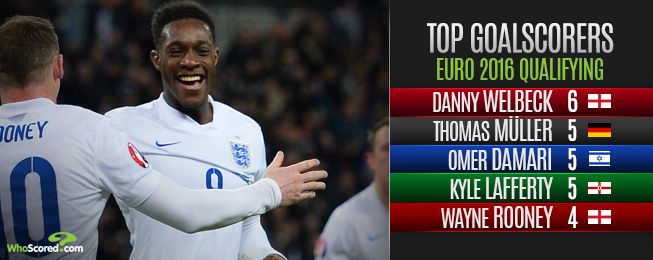
Why Danny Welbeck should be picked in England's XI ahead of Harry Kane

To some, perhaps, even the fact there is a debate seems ridiculous. Harry Kane is a forward who has scored 19 goals in the Premier League this season and has registered 3 assists. Danny Welbeck is a forward who has scored 4 league goals and registered 3 assists. The Kane story is an extraordinary one: he is a man in form who is at a stage in his career at which it seems he can do no wrong.
Every time you think it can’t get any better for him, it does. When Kane scored 79 seconds into his England debut against Lithuania last Friday, the general reaction in the press-box was a snort of laughter. Just how much more absurd can his story get? Every week or so, it seems, Kane announces to Twitter that he’s just had the best day of his life: with others you might become cynical, but the sense is that with him it’s probably true. Everything is just getting better and better and better.
So why, then, did Roy Hodgson pick Welbeck instead of him last Thursday?
Perhaps there’s an element of loyalty. Welbeck has, after all, over the past couple of years performed rather better for his country than his club sides. The goal he scored against Lithuania made him the leading scorer in qualifying with 6. But it’s more than that: it’s to do with the structure of the team.

This is a constant issue for national coaches. A club coach has a squad of twenty-odd players to choose from; a national coach has dozens of players potentially available to him. Form fluctuates between games; every time an international window comes around there’s a new player who’s flavour of the month. National coaches all over the world are constantly being asked to pick in-form players – usually forwards or creators – who have caught the eye. It’s a constant battle to resist the urge to – to use Hodgson’s phrase – “succumb to the clamour”.
International management, no less than club management, is about finding a balanced and cohesive team shape: it’s not about ramming the biggest names together and hoping they can find a way to play. This is an issue that’s undermined English football for years.
If Frank Lampard and Steven Gerrard were to play together in central midfield, there was need for a holder, but the 4-3-3 that implies held no place for Steven Gerrard and could accommodate only one of Wayne Rooney and Michael Owen. But all of the big names were habitually selected, leaving England to lament their “left-sided problem” while constantly being undone by a lack of stability at the back of midfield.

Why Welbeck gets the nod over Kane
Hodgson, by playing Welbeck, stuck to the 4-3-3 that has worked so well in qualifying, offering width to outflank packed defences. When Kane came on, it was for Rooney, for the 4-3-3 permits only one central forward. “Kane or Welbeck?” is a false dichotomy. In some sort of absolute sense, Welbeck may not be as “good” as Kane, but he can operate all across the front line, providing a width that Kane does not.
He makes 1.3 key passes per league game compared to Kane’s 0.7 and completes 81.4% of his passes to Kane’s 75.8%. He’s not such a goalscorer but he is more involved in link play, and that is what England need. Welbeck is also quick which, given how England’s approach against better sides is likely to be based on the counter-attack, is another vital asset.
Given how Welbeck played on Friday, his selection could hardly be questioned. He was persistently lively, managing 5 shots, 4 of them on target. He made 2 key passes and 7 dribbles, one of which led to the opening goal. He was a buzzing, constantly moving menace and Lithuania never got to grips with him as he achieved a WhoScored rating of 9.59.
Kane may play superbly against Italy on Tuesday – presumably in a front two with Rooney as Hodgson switches to a diamond – and he may carry on his goalscoring run in the Premier League for months. But as long as Hodgson plays a 4-3-3, it’s Rooney whose position he should be challenging, not Welbeck.